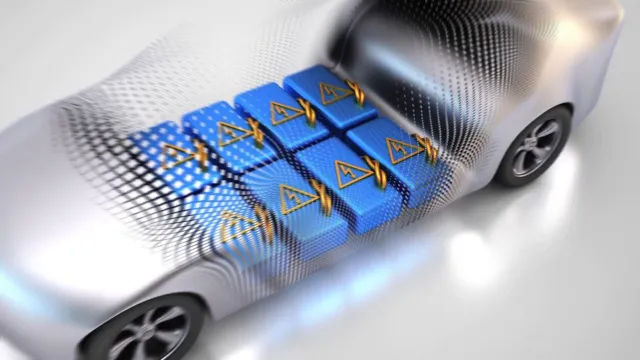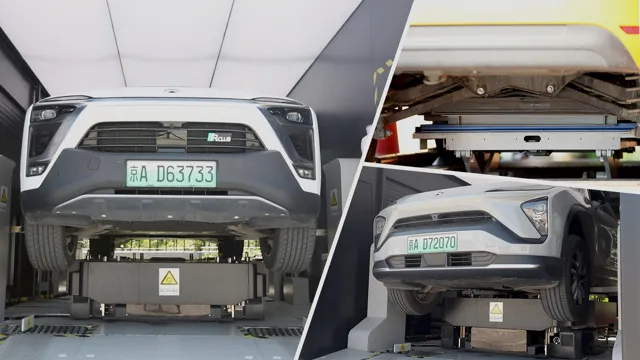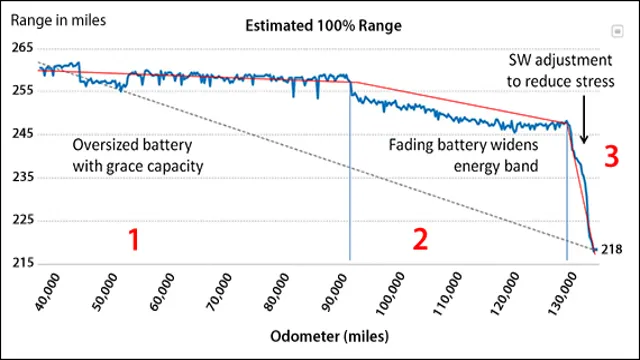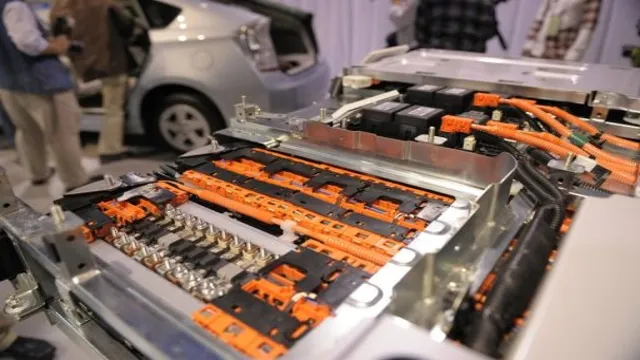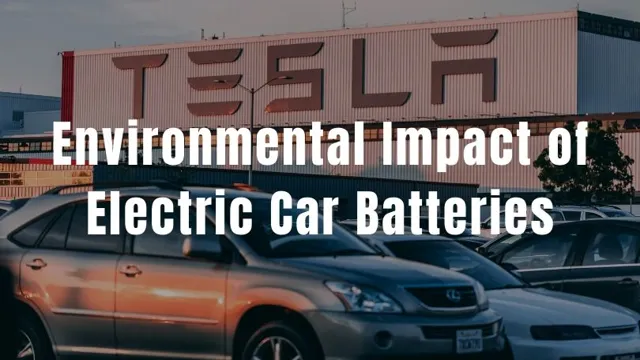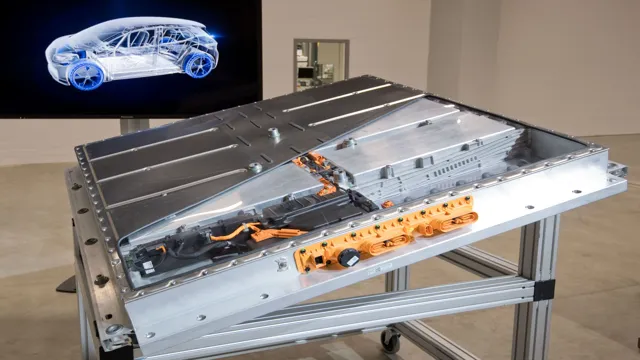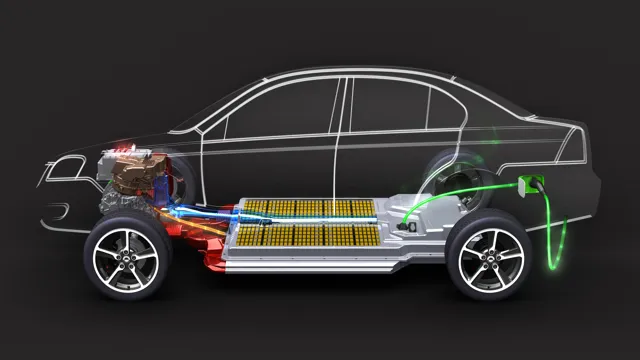Revolutionizing Electric Cars: Unpacking the Possibilities of Recycling their Batteries
Electric cars are quickly becoming a more popular and environmentally-friendly option for transportation. However, with the rise in the number of electric cars, the question of what to do with the batteries once they reach the end of their life span arises. Can you recycle electric car batteries? The answer is yes, you can.
In fact, recycling electric car batteries is necessary to prevent environmental damage and conserve valuable resources. This blog will discuss the importance of recycling electric car batteries, how it’s done, and what happens to the materials after the process. So, let’s dive in and learn more about this crucial topic.
The Environmental Impact of Electric Car Batteries
The growing popularity of electric cars can undoubtedly be attributed to their reduced carbon emissions as compared to gas-powered vehicles. However, the environmental impact of electric car batteries has come under scrutiny. A common question asked is whether batteries for electric cars can be recycled.
The answer is yes! The materials used to make these batteries, such as lithium and cobalt, are valuable and can be reclaimed, thus reducing the demand for new mining operations. However, the recycling process is still in its infancy, and scaling it up to meet the demand will require investment and innovation. Furthermore, the process of extracting and refining these materials can be energy-intensive and generate its own carbon emissions.
Therefore, while recycling batteries may mitigate some environmental harm, it is not a cure-all solution. It is important to consider the entire lifecycle of electric car batteries when assessing their overall environmental impact.
The Benefits of Recycling Electric Car Batteries
According to recent studies, electric car batteries have a profound impact on the environment due to the hazardous materials they contain, such as lead, cadmium, and lithium. The production and disposal of these batteries contribute to air pollution, water contamination, and soil degradation, which can lead to severe consequences for human health and the ecosystem. However, recycling electric car batteries can significantly reduce their impact on the environment by recovering valuable materials, such as cobalt, nickel, and copper, and reducing greenhouse gas emissions, energy consumption, and raw material extraction.
By recycling electric car batteries, we not only reduce the amount of waste that ends up in landfills but also contribute to the circular economy by preventing the depletion of natural resources and promoting sustainable practices. Recycling electric car batteries is a win-win solution that benefits the environment, the economy, and society at large.
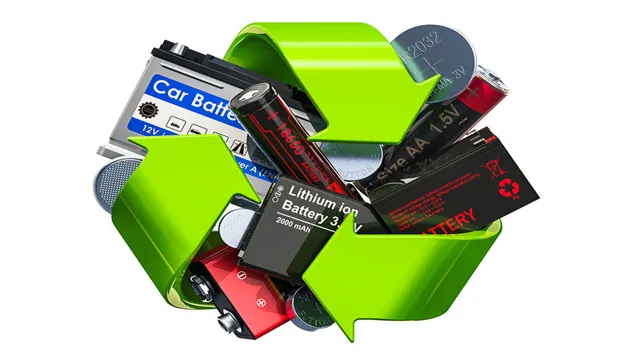
The Challenges of Recycling Electric Car Batteries
Recycling electric car batteries can be a complex and challenging process due to their environmental impact. While electric cars are an important step towards reducing greenhouse gas emissions, the batteries that power them can have a negative impact on the environment if not properly disposed of or recycled. The materials used in electric car batteries, such as lithium and cobalt, can be harmful to both human health and the environment if they end up in landfills or are not handled properly during the recycling process.
Additionally, recycling electric car batteries can be expensive and time-consuming, as the batteries need to be dismantled and separated into their individual components. Despite these challenges, it is crucial that we continue to work towards finding environmentally friendly solutions for recycling electric car batteries to reduce their impact on the environment.
The Current State of Electric Car Battery Recycling
“Can batteries for electric cars be recycled? Absolutely! In fact, recycling electric car batteries has become a crucial topic in the world of sustainability. With the increasing popularity of electric vehicles, the need for efficient and environmentally friendly methods of battery disposal is becoming more and more urgent. Fortunately, several companies are already tackling this issue.
One such company is Redwood Materials, which was founded by Tesla’s former CTO, JB Straubel. Redwood Materials has developed an innovative process of extracting valuable materials, such as cobalt and lithium, from used EV batteries, ensuring that these precious resources are not lost forever. Moreover, automakers like GM and Ford are also investing in battery recycling and working towards closed-loop recycling systems.
Electric car battery recycling may not be perfect yet, but the efforts being made are certainly a step in the right direction.”
Recycling Programs and Initiatives
Electric car battery recycling is becoming an increasingly important topic in the automotive industry. With the rise of electric cars, there is also a growing need for proper battery disposal to avoid environmental damage. Currently, there are several recycling programs and initiatives in place to address this issue.
For example, some companies offer battery take-back programs where customers can bring in their old batteries for recycling. Additionally, there are specialized recycling facilities that extract valuable materials from used batteries, such as lithium, cobalt, and nickel, which can be reused in new batteries or other products. While these programs represent a positive step forward, there is still much work to be done to improve the efficiency and effectiveness of electric car battery recycling.
Innovative Recycling Techniques
Electric Car Battery Recycling As electric cars continue to grow in popularity, the issue of what to do with their batteries once they wear out has become increasingly important. Recycling these batteries poses unique challenges due to their complex structure and the potential impact of their chemicals on the environment. However, innovative recycling techniques are being developed to address the issue.
For example, some companies are exploring ways to repurpose these batteries for use in energy storage systems or to create new batteries. Other methods involve recovering valuable metals such as lithium, cobalt, and nickel from the batteries, which can then be used in the production of new batteries. While there is still work to be done in developing efficient and cost-effective recycling processes, these innovative techniques provide hope for a sustainable future for electric car battery recycling.
The Future of Electric Car Battery Recycling
The future of electric car battery recycling is an important topic that has gained a lot of attention recently. The current state of electric car battery recycling is not well-established, and there are a lot of challenges to be addressed. While some companies are making strides in the field, there is still a long way to go before we can fully take advantage of the benefits of electric car battery recycling.
One of the main challenges is that not all electric car batteries are the same, which makes it difficult to recycle them in a standardized way. Another challenge is the safety concerns associated with handling lithium-ion batteries, which can be volatile and pose a risk of fire or explosion. Despite these challenges, the future of electric car battery recycling is promising.
Solutions such as battery reuse, material recovery, and closed-loop recycling are being explored. The use of recycled materials can decrease costs and reduce environmental impact, making electric vehicles a more sustainable option for our transportation needs. So, while the current state of electric car battery recycling is still developing, it’s important to remain optimistic about the future.
What You Can Do to Help
When it comes to electric car batteries, recycling is always a good idea. Not only does it help reduce waste, but it also helps conserve the valuable materials used to make the batteries themselves. So, can batteries for electric cars be recycled? Yes, they can! Many companies offer battery recycling programs, and it’s as simple as taking your old battery to a designated drop-off location.
Additionally, you can also consider purchasing a second-life battery, which is a recycled battery that’s been repurposed for use in another electric vehicle. So, if you’re looking to do your part in reducing waste and conserving resources, recycling your electric car battery is a great place to start!
Tips for Extending Battery Life
If you’re tired of constantly having to charge your devices, there are a few things you can do to extend your battery life. First, try reducing your screen brightness and turning on the power-saving mode. This can make a big difference in how quickly your battery drains.
Another tip is to close any apps that you’re not actively using, as they can use up a lot of battery in the background. Additionally, disabling any unnecessary features such as Bluetooth and location tracking can also help conserve battery. Lastly, consider investing in a portable charger or battery case to ensure you never run out of power when you need it.
With these simple tips, you can extend your battery life and enjoy uninterrupted use of your devices all day long.
Proper Disposal and Recycling Methods
When it comes to waste management, disposing of our trash properly and recycling as much as we can go a long way to help reduce the amount of trash that ends up in landfills or the ocean. One simple thing you can do to help is to separate your trash properly. This means separating recyclable materials from non-recyclable ones.
Make sure to properly rinse out bottles and containers before throwing them away, to make sure they are clean and the recycling process can be more efficient. Additionally, you can look into local recycling programs to find out what materials they accept, as some may not take certain types of plastics or other materials. By doing your part and properly disposing of your trash and recycling, you can make a big difference in protecting the environment and conserve resources for future generations.
Final Thoughts
Yes, batteries for electric cars can be recycled, and it is a crucial step towards a more sustainable future. Recycling these batteries ensures that valuable resources, such as metals and minerals, can be extracted and reused instead of being wasted. Additionally, responsible disposal of electric car batteries protects the environment from harmful chemicals that can leak into the soil and water systems.
The process of recycling electric car batteries is complex and requires specialized facilities, but advancements in technology are making it more efficient and cost-effective. By choosing to purchase and support electric cars, you are also choosing to contribute to a cleaner and more sustainable future for generations to come.
Conclusion
In conclusion, while the recycling of batteries for electric cars does offer some challenges, it is entirely possible. And considering the important role that electric cars will play in reducing emissions and combating climate change, finding a way to recycle these batteries is absolutely crucial. So if we want to protect our planet and ensure a sustainable future, let’s give new life to those batteries and keep them rolling!”
FAQs
Why is it important to recycle batteries from electric cars?
Recycling batteries from electric cars is important for both environmental and economic reasons. It reduces the amount of hazardous waste in landfills and conserves valuable resources like lithium, cobalt, and nickel. Additionally, recycling batteries can help create jobs and reduce dependence on imported materials.
Can all types of batteries from electric cars be recycled?
Not all types of batteries from electric cars can be recycled, but many can. Lithium-ion batteries, which are commonly used in electric cars, can be recycled to recover valuable materials like cobalt, nickel, and lithium. Other types of batteries, like lead-acid and nickel-metal hydride, can also be recycled.
What happens to batteries from electric cars when they are not recycled?
When batteries from electric cars are not recycled, they can end up in landfills or incinerators, where they can release hazardous chemicals and greenhouse gases into the environment. Additionally, valuable materials like lithium, cobalt, and nickel are lost, which can increase the demand for new materials and contribute to environmental degradation.
How can I recycle batteries from my electric car?
You can recycle batteries from your electric car by contacting a recycling facility that specializes in handling hazardous waste materials. Many car manufacturers and dealerships also have programs in place for recycling batteries from electric cars. Additionally, some local governments offer collection programs for hazardous waste materials, including batteries.
